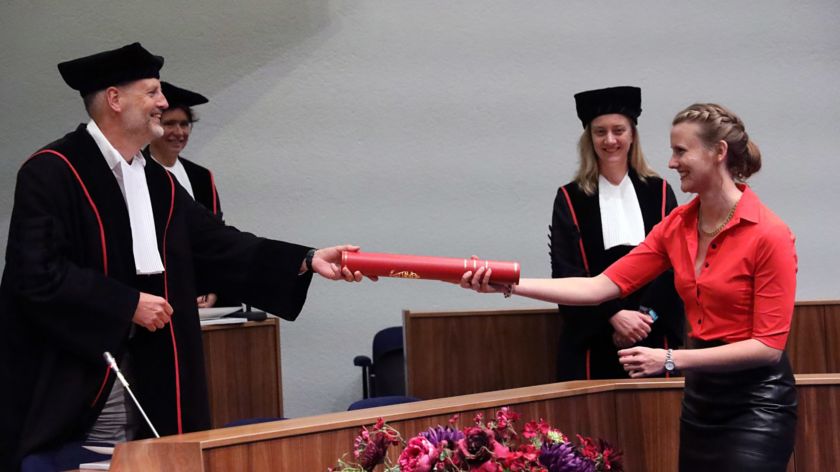-
 Elja Louer receives her doctoral degree. Photography: Theo Hafmans
Elja Louer receives her doctoral degree. Photography: Theo Hafmans
A lot of PhD candidates are suffering from depression. They also often run into delays. It is high time for a change, according to researcher and writer Julian Kirchherr. He states that PhDs can be done a lot faster, with higher quality and more impact. He will be giving a lecture in Nijmegen this Thursday.
‘The average PhD candidate is miserable’, announces Julian Kirchherr; researcher at Utrecht University and author of the book The Lean PhD. According to the Promovendi Netwerk Nederland, 60 percent of PhD candidates experience high or too high work pressure, and nearly half of all PhD candidates have an elevated risk of mental health issues, such as depression or a burn-out. According to Kirchherr, this is not just the case in the Netherlands. ‘The PhD systems of every country in the world are completely broken.’
Kirchherr thinks that lacking communication with supervisors, long days of isolation, and too little appreciation all lie at the heart of the issues. ‘In The Netherlands, you can get a decent salary as a PhD candidate’, Kirchherr thinks. ‘But that does not compare to what you’re doing: thinking of something that the six billion living people on earth, and the billions more before us, haven’t thought of yet.’
PhD as a start-up
This is why Kirchherr suggests that the ages-old PhD system needs an upgrade: a PhD track should be thought of as a business start-up. After all, according to Kirchherr, a starting entrepreneur and a PhD candidate have a lot in common. ‘Both of them must – if they want to be successful – create something new using minimal means. And in both cases, the road to the final product is bumpy, unsure, and with plenty of dropouts.’
‘Could ideas from entrepreneurs make PhD tracks more successful?’
While the academic world has been trudging along at the same pace for years, entrepreneurships have already experienced a shifting trend. Rather than making elaborate plans and doing market research, today’s entrepreneurs are seeking out new possibilities much more quickly; from there they can continue to build.
Kirchherr’s book The Lean PhD develops on ideas taken from ‘The Lean Start-up’, a book by Eric Ries. Kirchherr: ‘If PhD candidates and new entrepreneurs are so similar, and these ideas helped to make start-ups more successful, couldn’t they be used to make PhD tracks more successful as well?’
Fewer Dropouts
This would require a drastic shift in the methods of PhD candidates. ‘There is no other sector in the world where I can see as much perfection as in science. Scientists write and rewrite every sentence 15 times’, Kirchherr sighs. That needs to change. ‘Start by making something that is simply ‘good enough.’ Share it with your fellow candidates, supervisors, and other people in the field, and ask for feedback’, the researcher states. ‘Combined, they have vastly more knowledge than you by yourself.’
By asking for feedback at intervals, candidates should be able to finish their research more quickly and with a higher degree of quality, according to Kirchherr. This will simultaneously lead to more enjoyment of the research and consequently fewer dropouts. ‘Right now, PhD candidates spend every day on their own in a library. That’s a pity; they should be out and about!’
Criticism
However, Kirchherr’s vision does not resonate with everyone. Linguist and PhD candidate Marten van Meulen calls Kirchherr’s book ‘neoliberal.’ PhD candidate and historian Adriaan Duiveman is mostly positive about the book, although he too wonders if the recommendations will work in academia, “a place where cooperation prevails over competition, in contrast to the free market.”
‘My ideas are hard to implement in such a conservative sector’
According to Kirchherr, these criticisms only serve to emphasize that his theory is not always understood. ‘People see ‘lean’ and ‘business’ and they immediately assume that this can’t work in science. My ideas are hard to implement in such a conservative sector. Besides that, it is true that my theory is not fully applicable to every area of research. However, I still think that there is a little in it for everyone.’
Kirchherr emphasizes that The Lean PhD’s underlying principle is not done yet. ‘I propose a new way of doing things, and I would love to hear what other scientists think of it. It is vitally important that we cooperate and think of ways to improve the PhD track. Considering these dropout rates and the number of mental health issues, it is impossible to claim that the system works fine the way it is.’
Lecture
Kirchherr will be giving a lecture this Thursday, at the invitation of the Graduate Schools of the Faculties of Arts and Law in Nijmegen. After the lecture, there will be a discussion. One of the major themes will be if PhD candidates in the Arts or Law should be able to obtain their PhD degree based on articles. PhD candidates from other faculties are welcome, provided there is enough room. You can sign up here.



